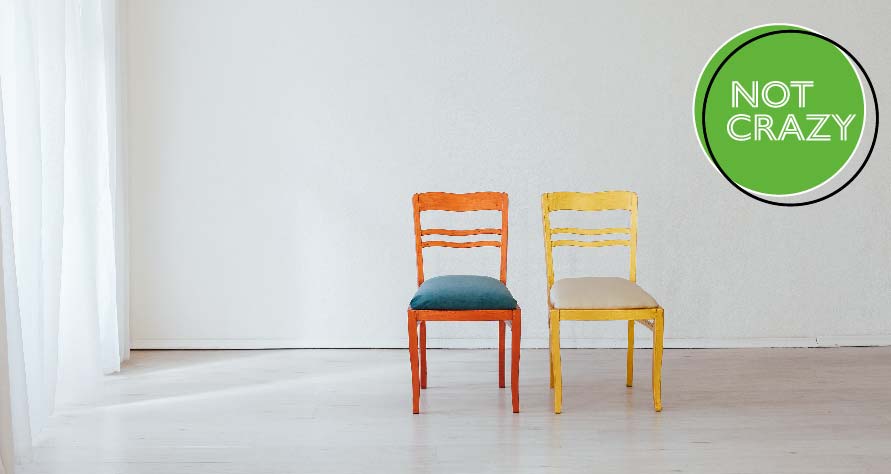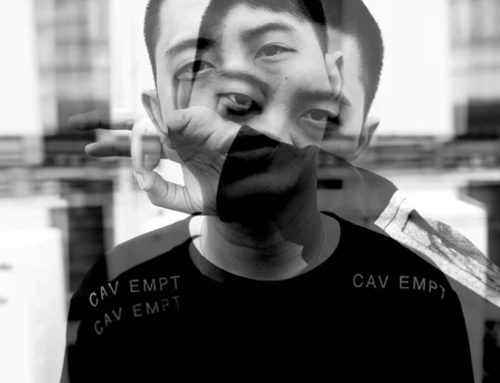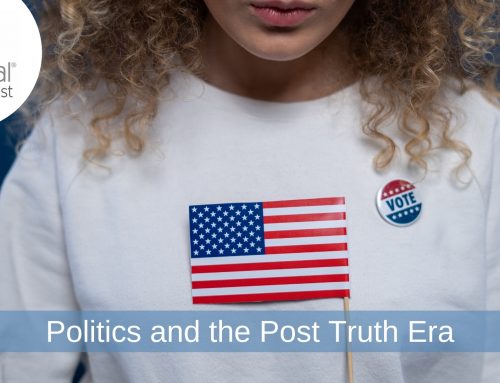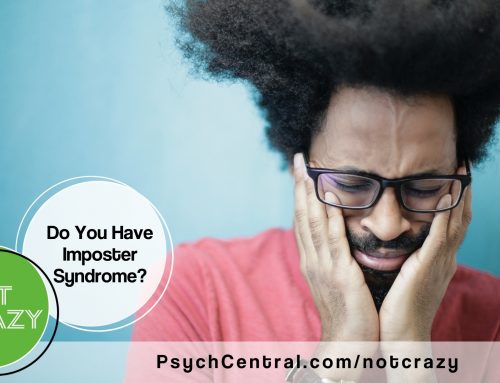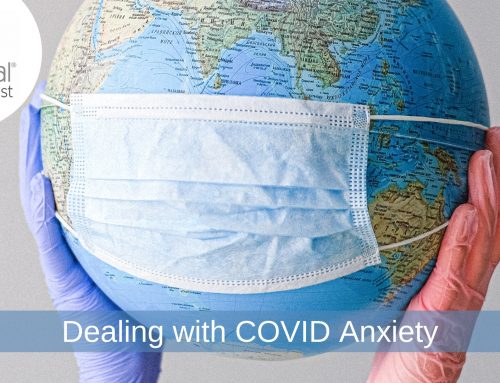The dreaded day has arrived. That party you’re supposed to attend sounded like a great idea — last week. Now the day is here and you’re absolutely dreading it. Should you cancel? Or just suck it up and go? After all, you’ve canceled so many times your friend might never call again. Join Gabe and Jackie as they discuss why people with anxiety disorders have such a hard time keeping plans and get specific tips on easing your fears. Click the player below to listen!
SUBSCRIBE & REVIEW
Computer Generated Transcript for “Anxiety- Leaving Home” Episode
Editor’s Note: Please be mindful that this transcript has been computer generated and therefore may contain inaccuracies and grammar errors. Thank you.
Announcer: You’re listening to Not Crazy, a Psych Central podcast. And here are your hosts, Jackie Zimmerman and Gabe Howard.
Gabe: Hey, everyone, and welcome to this week’s episode of the Not Crazy Podcast. I would like to introduce my co-host, Jackie.
Jackie: And that . . . I wanted to do something fun and I fucked it up already. Mm hmm.
Gabe: I just think we should leave that. I wanted to do something fun and I fucked it up already. My co-host, Gabe.
Jackie: And as it turns out, I’m not funny, but my co-host is Gabe.
Gabe: Well, I am really glad that you are here, Jackie, because I can record this podcast in my house and that means I don’t have to leave my house. And while I am not agoraphobic, I do have anxiety when it comes to going to certain places. And that’s our topic for this week’s episode, anxiety when it comes to leaving our homes.
Jackie: And this is something that we’ve seen a lot of people asking about is I’m anxious to leave the house or I’m anxious when I leave the house and how do I get out of the house? What do I do to actually go into the world? So we thought it was a good topic.
Gabe: And kudos to everybody for not wanting to be homebodies and our society is set up to make this easier than ever. Now, I don’t want to do this thing where back in my day. But yeah, yeah, back in my day I couldn’t really hang out in my house for weeks at a time because I’d eventually run out of food. I suppose pizza delivery was a thing, but Amazon was not.
Jackie: Ok. Grandpa Gabe. Well, we have all these lovely amenities now, too, where you can stay home if you want, but it’s not the point of the show. Point of the show is leaving.
Gabe: I don’t know if it was easier to be a “home body” 30 years ago than it is today. On one hand, people seem to be away from home more often. And I wonder if that general societal slide into not being home very often creates extra fear or panic anxiety in people who want to be homebodies. And where is that line? Because some people just like to stay home and there’s nothing wrong with that. But we do see a lot of you need to get out more on the Internet for people who are just like, no, I don’t, I just I don’t want to. It’s a choice. It’s not anxiety. It’s a choice.
Jackie: I think that’s a good point that I didn’t really think about, was we have more things that take us out of the house these days, maybe not more, but I feel like there’s so many things to do all the time that when you are out of the house, maybe you wish you weren’t. And I think that’s a side effect of being a human at least. Adam and I talk about that all the time where we make plans and then immediately regret that we made plans because we don’t want to go anywhere. So.
Gabe: I also hear that is adulting. All of this just to say I am curious, as a person living in America, how much of this is caused by, like FOMO — fear of missing out — where you’re not anxious, you’re not having a mental health issue, you’re not having a mental illness symptom, everything is fine in your life. It’s just a Saturday afternoon. You just want to put your feet up and read a book. But in your brain, your brain is like you should get out more. I guess sometimes I just feel that people get shamed for staying home. And that makes me sad because I really like my home and I’m a very extroverted person, as you know, and even I just like to chill out at home.
Jackie: If I could stay home and never leave ever again, I would gladly do it. I hate leaving my house. Yes, I like interact with the world and things, but I legitimately would stay home. That’s why I’m such a great work from home person, because I will work from home and never go anywhere. It’s amazing. But it’s not related to anxiety for me. I just really like being at home. I like my stuff and my animals and my husband and I just want to be here.
Gabe: Well, let’s talk about that for a moment, Jackie. Let’s talk about your specific situation. You are a person with an anxiety disorder, so you understand the anxiety surrounding just minuscule tasks, right? Just, hey, I’ve got to go get the mail at the end of the driveway. Nooo, you understand that kind of situation, right? But you’ve also said that you never, ever want to leave your house. But if you never left your house, you could never see Hanson live again.
Jackie: That is that is true. There are things that I want to leave the house for, right? It’s just I’m not looking forward to leaving the house. I will do fun things. I will go places. I don’t really want to. I’m happy when I did and I don’t know, maybe there is a root cause of anxiety in there somewhere. I don’t feel anxious when I leave. I feel like dread. Like I just don’t want to.
Gabe: Let’s put it right in the context of the Hanson concert, because you love Hanson
Jackie: I do. I absolutely do.
Gabe: Mmm-bop. Bop doo wop.
Jackie: You’re gonna make me not love it.
Gabe: Nope, not doing it justice?
Jackie: No, no.
Gabe: Did you get anxiety when you left for your last Hanson concert?
Jackie: No.
Gabe: So, if it is something genuinely that you want to do, you do not experience anxiety.
Jackie: No, I was super anxious when we got there, though, because there were so many fucking people everywhere, but the actual act of leaving to go there was not an anxiety ish anxious
Gabe: Anxiety producing?
Jackie: Anxiety having? I don’t know.
Gabe: This is interesting to me because for many people, again, one size does not fit all. For many people, they have the thing that they want to do and they’re excited about that. And in this case, it’s the Hanson concert, but they’re afraid to leave their house for fear of having a bad experience and anxiety attack, a panic attack, something bad happening. So it’s not that they’re afraid to leave their house. It’s not that they don’t want to go to, in this case, the Hanson concert is that they’re afraid that when they get to the Hanson concert, they’ll have a panic attack. They’ll be in harm’s way. They’ll embarrass themselves, they’ll hurt, they’ll suffer, etc. That is generally how the anxiety surrounding leaving your home works. It’s more of a fear of what might happen after you leave than it is about the person, place or thing.
Jackie: Agree. I mean, I think I agree. I don’t totally experience this a lot, but from what I have read from people who listen to the podcast or interact with us online, it does sound like that is the more common scenario is I leave the house, but I’m afraid of what happens once I leave the house, which is different from I am afraid of leaving the house. You know, like I’m so anxious I cannot leave because I can’t do anything when I’m at home. I can’t function, I can’t clean, I cannot move because I’m so anxious. I’m paralyzed by it. That’s different than I’m willing to leave. But I’m a little bit afraid of what happens on the outside.
Gabe: Generally speaking, the prep to leave is filled with excitement, as you pointed out in your example, you were excited to make the plans, you made the plans for a reason. Whatever is on the other end of your door you are excited to get to, that doesn’t magically change. It’s the fear of the unknown. That’s really what it comes down to. Your house is safe. The place that you’re going. While fun and exciting, potentially could not be safe and not based on anything that that place did. You know you didn’t read in the paper that the building’s going to be condemned or that security is lacking. There’s not like a virus threat or it’s none of that. It’s just that you could have a panic attack. And now you’re sitting there shaking, panicking, sweating. Your heart is palpitating. You’re getting dizzy. You’re embarrassed because, well, in my case, I would completely sweat through all of my clothes and be just a dripping, soaking, wet, sweaty rag. Well, now I’m going to ruin it for my friends or my wife. If I stay home, I won’t ruin it. Chris. I won’t have it at all, but I won’t ruin it.
Jackie: I also think that it’s worth noting here that we are putting a lot of rational thought behind the reasons why maybe somebody has anxiety once they leave the house. But for me, anxiety makes no sense. It never makes sense at all. It’s always just my body going like, run, run from what? I don’t know. And so I think it’s worth noting that you might be excited to leave the house and you’re anxious the moment you walk out the door, but you have no idea why. You just are. It’s just part of how you are in that moment.
Gabe: It’s really weird how anxiety sort of manifests itself in me because I’m a public speaker. I don’t mind being onstage in front of a thousand people. That doesn’t bother me at all. I don’t mind that the podcast that we do are listened to by tens of thousands of people or, you know, my name, my thoughts and my opinions are out there a lot. And as such, I get a lot of blowback. And this doesn’t bother me at all. I have no idea why this causes me zero anxiety. But I had a panic attack at Disney World or Disneyland, whichever one is in Florida. I don’t know why I wasn’t afraid to leave my house to go to Disneyland. Or world. I wasn’t afraid to leave the hotel that morning. But something happened. The place that I had planned in my mind to get a Diet Coke was out of Diet Coke and poof, it just went poof.
Jackie: To me, that makes total sense, though, because Disney World Land sounds like I can think of no place I want to go less in life than Disney World Land because there are so many people there and children which I don’t like. I just feel like I would be anxious all the time. Big crowds make me anxious. Lots and lots and lots of people. If I’m speaking to those people, I’m not anxious. But if I’m in the crowd with them, I get pretty anxious. And that’s a new thing that has developed later in life. That was never a thing before. So I don’t know what that’s all about, but I just don’t think I would have fun there. And I think a lot of people look at the amount of people, the traffic, the foot traffic for Disney World Land on a day is just bananas.
Gabe: I thought you were going to say it was goofy.
Jackie: Oh, god. Barf.
Gabe: But sometimes we have to do things because our spouses want to. I’m with you, Jackie. Disney World Land was not my vacation pick. It was my wife’s vacation pick. And part of being in any good relationship, whether it’s a marriage, a friendship, a family or even with coworkers, is sometimes they have to get their way. This was very important to my wife. I’m very glad that I went. And while I agree that this this uber sugary. Oh, it was it was just it was just so gooey perfect that it just it just I’m starting to get like like like hives. I don’t know. It was kind of neat. I did have fun. Maybe I had fun because I saw it through my wife’s eyes. I don’t know. But I guess this is one of the areas where I think to myself, I could have used my anxiety disorder to avoid the trip altogether. I could have used the anxiety and panic attack that I had that morning to avoid the rest of the day. At what point do we have to fight through the anxiety for our benefit and at what point do we owe it to the people that we’re with? One of my biggest fears is that my anxiety hurts the people around me. I made a promise to my wife that we’d have a good time at Disney World Land and that panic attack did it. I don’t want to say it ruined the morning. My wife was just sickeningly wonderful. She didn’t let it get to her, but it did cost us a couple of hours.
Jackie: I think the guilt is always a factor. Right. Even if it’s just I was late for something because I was panicking or we didn’t get to do something because I was panicking or I was a dickhead this morning because I was panicking. I feel like the guilt surrounding all of this is not light. It feels very heavy. And it feels it feels like I’m ruining things for other people if it happens.
Gabe: I often feel that my anxiety disorder impacts the people around me and it creates another layer, so I’m afraid to leave the house because I’m afraid I’m gonna have a panic attack and suffer. I’m afraid to leave the house because I’m afraid that that panic attack and that suffering is going to have negative consequences on other people. My wife is very supportive and frankly, she helps me leave the house. Going with her makes me feel stronger and better supported and better able to deal with a lot of the things that maybe scare me about leaving my house and going to an unknown place. But that’s a wife. It’s a lot harder when I have to do this for a friend. And I think that maybe sometimes we create through our anxiety some of these self-fulfilling prophecies that we believe that people have abandoned us because of our mental illness, because of our mental health issues, because of our anxiety. But in actuality, we abandoned them because of our mental health issues, mental illnesses or anxiety, because they kept making plans with us and we kept canceling on them at the last minute. I struggle with this a lot because I see these memes on Facebook where they’re like self-care is canceling plans at the last minute. Self-care is not answering the text immediately. Self-care is saying no to invitations. And that’s all true. I completely agree with all of that. But from the other person’s perspective, you canceled plans at the last minute, interrupting their time. They texted you and you didn’t reply and they keep inviting you out and you said no. And then I see the other stack of memes. It’s like people abandoned me because of my mental illness. That’s stigma and discrimination. How does that all factor into this nightmare? That is an anxiety disorder.
Jackie: That’s so true. Sometimes when people invite me places and I say no, because I just don’t want to. I always thanked them for inviting me and say, like, please invite me again sometime because I might be willing to leave the house sometimes. But it’s true. Right. You’re there’s the FOMO. But then there’s the JOMO, which is the joy of missing out. So you have these self-care memes which are in direct opposite of the other ones of people. Stop talking to me. I lost my friends. All of the things that you’ve already just said. I don’t know the middle ground. We’re doing the thing where you are like, I’m going to stand my ground. I’m going to say no and do this for me. And then you say no to everything versus like just some things or it’s the complete opposite of I say yes to everything and I’m super drained all the time and nobody gives me time to rest. And everything is awful. It’s supposed to be a balancing act. It’s everything is supposed to be in moderation.
Gabe: We’ll be right back after these messages.
Announcer: Interested in learning about psychology and mental health from experts in the field? Give a listen to the Psych Central Podcast, hosted by Gabe Howard. Visit PsychCentral.com/Show or subscribe to The Psych Central Podcast on your favorite podcast player.
Announcer: This episode is sponsored by BetterHelp.com. Secure, convenient, and affordable online counseling. Our counselors are licensed, accredited professionals. Anything you share is confidential. Schedule secure video or phone sessions, plus chat and text with your therapist whenever you feel it’s needed. A month of online therapy often costs less than a single traditional face to face session. Go to BetterHelp.com/PsychCentral and experience seven days of free therapy to see if online counseling is right for you. BetterHelp.com/PsychCentral.
Jackie: And we’re back talking about why leaving the house sucks. Just kidding, we’re talking about anxiety.
Gabe: The thing to be careful about, right, is that you’re just not constantly canceling on the same person over and over again. And this is where we have to be more judicious with the things that we agree to do. I’m one of these people where my friend Jackie calls me up and she’s like, okay, do you want to go to the club? It opens at 11:00 p.m. It’s boots and pants and boots and pants and boots and pants and boots and pants. And we’re gonna dress like 70s and it’s gonna be awesome.
Jackie: Ugh.
Gabe: Three months from now, it’s on Halloween and I’m like, I want to dress up like Halloween. And then, of course, it gets there. And I’m like, oh, man, I normally go to bed at like 10 o’clock. I don’t have this outfit. The music is loud strobe lighting.
Jackie: No. Hard pass.
Gabe: So, I call you up and I’m like, hey, I can’t make it. You’re pissed. You’re agreeing with me. But but pretend that you’re really excited about this because Hanson’s gonna be there. It’s Hanson. It’s always comes back to Hanson. But you have tickets. You bought your costume. You’ve been looking forward to this for three months. We’ve had conversations about it. It’s now the day before. That’s mind numbingly awful for you because you put all this time, energy, effort and money into this and you were excited to share it with me and I just bailed on you. And if I’m being honest, I probably gave you a bullshit reason. Hey, I’m not feeling well and my kids are sick and I’ve got to take the dog out. And, you know, Kendall’s she had surgery seven months ago and I really can’t. It’s snowing, so. Yeah, sorry. And that’s in a text message that I then don’t reply to. Would it have been better if when you got all excited about this and I got wrapped up in it, I realized that, hey, boots and pants and boots and pants and boots and pants at 11:00 pm is just not a thing that I want to go to. And I told you no. And then I said to you, look, I’m always going to say no to that. It’s not my thing. But could we maybe go to lunch at a restaurant that I feel more comfortable with? Is this where the onus falls on the person with the anxiety disorder to be better?
Jackie: Yes, obviously that would have been better for sure. But I also think that we’re getting a little bit off topic because we’re talking about canceling plans that have already been made. And I think that if we’re focusing on how to get out of the house, those are different. Right. Because that’s something like you’re like, oh, I’m super anxious. I don’t want to go to this thing. That’s a little bit different than canceling plans, I think.
Gabe: Ok, so let’s talk about that, because the the anxiety makes makes me, makes us, if we’re being honest, cancel shit all the time. It just does. So let’s talk about strategies to not do that. So it’s now the day before the boots and pants and boots and pants and boots and pants. And I want to cancel. What are some things that I could do to ensure that I show up at 11 p.m. dressed in the 70s garb so that you can have your strobe lights and hear Hanson and you are not just bitterly disappointed that your buddy Gabe bailed on you for the hundredth time.
Jackie: I mean, I could tell you all the things that are the right things, right? I will tell you. Make sure you have everything planned out. Make sure you have your directions lined up. Maybe take a nap during the day. Talk to somebody about maybe why you don’t want to go and have them amp you up. You know, all those things. But I’m going to tell you. For me, it’s just get off your ass and go and dread it the whole way there. Be angry in the car there. Be sad. Maybe pout. Talk about how much you hate it. And you really wish you were at home. And then get there and be like. It’s not so bad because it always is not so bad. Whenever I agree to do something, it’s because I want to do it. It sounds like fun. It’s just getting me there. That sucks. So once I’m there, it’s generally okay. But I have not found a way to sort of get me amped to get going when I’ve already decided I don’t want to go. I have to just suck it up and go. And that’s the only thing that really works for me. And most of it, honestly, is it surrounds money. Did I pay for this thing already? If I paid for it, I’m probably going to suck it up and go. If I haven’t paid for it, then I might cancel.
Gabe: I like the don’t lose money. I’m really all about the pre-planning. One of the things that I have learned is to say to you, Jackie, I want to go with you, because that does sound interesting. I’ve never been to a party like that. I want to do the co-host costume idea with you, but I’m gonna need some things from you to make this happen. So, like, I’m being very honest with you. And what I’m going to say is I need you to pick me up. I need you, Jackie, to drive to my house and put me in your car and drive me there, because I have a lot of anxiety about driving to places that I’ve never been before. I don’t know where to park. I’m afraid I’m gonna lose my car. I just call this entire method the buddy system. I tell all of my friends that you have significantly better odds of me going if you pick me up. Now, I try to be nice about this and I buy dinner or dessert or I offer people gas money or I’ve had my friends drive over to my house and we take my car, I’ll do the driving. But you do the directing like maybe that helps. Or all of my friends, I’m okay driving to all of their houses, so I’ll drive and pick them up because I’m comfortable driving from my house to their house. So meaning there is almost something that I never, ever, ever, ever do. And I’m shocked at how big of a difference this makes.
Jackie: I think there’s a excellent idea. It also makes it so you really you can’t back out on the way there because you’re not driving.
Gabe: It also helps because it’s setting those small goals, right? My plan is, OK, at 9 o’clock I pick up Jackie like that’s my plan. Gabe, what are you doing? At 9:00, I pick up Jackie or at 9 o’clock Jackie picks me up and this gets me into my next thing I call it pre-gaming. Now, I know that the younger generation, that means drinking expensive alcohol, cheap at home so that you can continue drinking low grade alcohol when you have to pay for it. That’s not what I mean. So I just mean the eleven o’clock thing scares me. I’ve never been to this bar. I’ve never had the music, the strobe lights. I am for whatever reason, anxious about it. So Jackie picks me up at 9:00 o’clock and we go to Olive Garden.
Jackie: Yuck.
Gabe: Because I like Olive Garden. So now I have to be ready at nine. That’s step one. Then I go to Olive Garden with Jackie, which I like. And then after Olive Garden, Jackie drives me to the thing that I’m scared of. I’m slowly ramping up in the evening that way. It just seems more manageable to me. This helps me a lot.
Jackie: You’re like a child that gets their treat before dinner. Right? Let’s do the thing that makes me happy. Before we do the thing that I don’t know that I really want to do.
Gabe: Exactly. And I want to be clear that I feel that not only does the slow ramp up help manage my anxiety, but I’ve also told you that that’s why we’re doing it. I’ve told you, Jackie, that I’m nervous about this. I’m anxious. I need your help and I need a slow build. And another thing that I try to do is I remind myself, OK, I just have to do this for a half an hour. I make like a clear goal with you. I’m like, OK, I’ll do this. But every half hour we reassess. We will go at 11:00. So at 11:30, we decide if we’re gonna stay. And it’s two yeses and one no. If I say I want to go and you want to stay tough shit, we’re leaving.
Jackie: Well, I think we live in a time where that doesn’t necessarily have to play anymore, right. You can always Lyft yourself home, you know, which I think is a great option that we have now where I’ve gone places that I can’t give a great example right now. But I know this has happened, that I was like, yes, we’ll stay the whole time. And then I kind of hate this. So I just got a Lyft and left and nobody was mad. I didn’t make anybody miss out on what they were doing. There wasn’t a lot of guilt because they were still enjoying the thing that we set out to do. It was like everybody wins.
Gabe: Yes. And your friends. So often when I explain these things, people are like that is like uber high maintenance. Gabe, who would tolerate that? The answer is my friends, my friends and family. And they always hate it when I say that they tolerate it because they listen to this. And like Gabe, we don’t tolerate it. You were honest with us from the beginning. And I really like my friends and family because they’re like, you realize you never leave. You close the place down. You always say, OK, I’ll go for a half an hour and you’re the last person out the door. You you have so much fun. It’s the initial getting there that terrifies me so much. Once I’m there, I figured out where the exits are. I figured out where the bathrooms are. I figure out how to get a drink. I make friends with the servers. I. I understand the outfit. People are like talking to me. Then it’s like, poof. I am the Gabe that people know and love. So they’re kind of banking on that. But the few times that I have left that I’ve invoked the half an hour clause. They’re just like, hey, it’s a good trade. I’m thankful that I have the right people in my life. I really, really am. And I understand that not everybody has that. But I am a little bit sincere when I say maybe the reason you don’t have this in your life is because you didn’t plan for it. You pulled the rug out from under them by telling them that everything was fine, pretending that everything was fine. And then after you were there for a half an hour, you freak out and you leave. And then when they ask what happened? You say stuff like it was too loud and it was stupid. Who does this? And you start insulting the thing.
Jackie: Would you really say that?
Gabe: Oh, my God. I’m in the middle of an anxiety and a panic attack. I’m sweating through my clothes. My heart is racing. And I think I’m going to die. I will say whatever it takes to get the hell out of there.
Jackie: Well, I would just leave.
Gabe: But we drove together.
Jackie: I don’t care. I will stand outside and wait for you or I’ll call Lyft.
Gabe: I do see what you did there, Jackie, and I love it. Listen up, listeners. Here is what we need you to do wherever you downloaded this podcast. Please subscribe, rate, and review. Share us on social media and use your words. Tell people why they should listen. And finally, if you have any show, topics, ideas or burning questions, email us at show@PsychCentral.com and tell us all about them. And remember, after the credits is all of the outtakes and all of the things that Jackie and I just fucked up along the way and it’s ultra funny and it will make our producer and editor really, really, really happy if you listen to them.
Jackie: We’ll see you next week.
Announcer: You’ve been listening to Not Crazy from Psych Central. For free mental health resources and online support groups, visit PsychCentral.com. Not Crazy’s official website is PsychCentral.com/NotCrazy. To work with Gabe, go to gabehoward.com. To work with Jackie, go to JackieZimmerman.co. Not Crazy travels well. Have Gabe and Jackie record an episode live at your next event. E-mail show@psychcentral.com for details.
This article originally appeared on Psych Central as Podcast: Canceling Plans Due to Anxiety.



